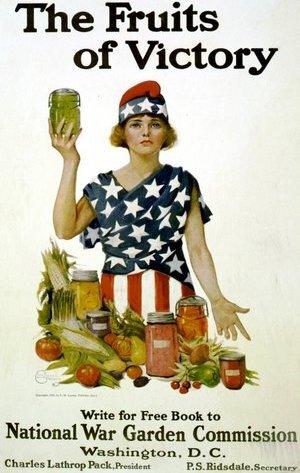Victory Garden
My grandfather will be 98 years old this year. He is a veteran of World War II. Montgomery Jackson Kennedy, known as “Jack,” served in the U.S. Navy and survived an air raid by the Japanese while in the South Pacific. The air raid destroyed the small ship he was on and he was rescued shortly after by another navy vessel.
My father is also a veteran. Victory Franklin Wilson, “Vic,” served in the Vietnam war for the U.S. Army. Both of these men in my life are huge influences to me and I am so proud to have men like this in my life. Both of these men love to garden. My dad still grows a large garden and my grandfather grew a garden until just a few years ago.
I have learned to love gardening from all the older generations that have been in my life. I mentioned my grandfather and my father because gardening was not just a hobby for them but a means of survival. My grandfather grew up through the Great Depression and gardening was necessary to have food on the table.
My father also talks about growing up poor without electricity and running water. His mother gardened and canned her own foods to be able to feed seven kids.
During World War II the federal government used propaganda ads to promote gardening. The purpose of this propaganda was to help ease the burden of the food supply demand to feed the troops. World War II may have been one of the most patriotic times this country has ever seen. These gardens being grown during this time were called “Victory Gardens.”
Victory Gardens were grown by nearly half of all American families during this time. Some statistics I have read were at least 20 million victory gardens covering more than 20 million acres were grown in America by the year 1943. Forty percent of the country’s produce was supplied by these gardeners and approximately eight million tons of food was grown in Victory Gardens.
Recycling is now being promoted as a way to save the environment, but nearly 80 years ago people were being encouraged to save and reuse raw materials as well as grow a Victory Garden as a way to help win the war. Patriotism was so high that people were glad to do their part to help the war efforts.
The U.S. government worked with groups like the Boy Scouts, Girl Scouts, FFA and 4-H to promote and educate the American public about the benefits and importance of growing your own food, canning your extra produce and saving/sharing seeds with other members of your community.
Some of the propaganda had very clever slogans and sayings to promote this idea. Sayings like “Yes I Can,” “Can All You Can,” “Of Course I Can” and “Garden for Victory” all were used on posters and advertisements to encourage people.
Americans are the most unhealthy we have ever been. Gardening has proved not only to grow and support a healthy diet but it also has other health benefits. Gardening is a great way to get some physical activity in your life and has proven benefits to your mental health from working in the dirt and the sun.
With inflation causing the price of groceries to drastically rise, stress and mental health plaguing millions of Americans, as well the physical health of Americans due to poor diet and lack of exercise, I believe it's time to bring back the Victory Garden.
We need a victory in the well-being of the people of this country. I believe gardening could be a huge step in the right direction for the health and well-being of this country.
Everyone can be involved in a little gardening even if you live in an apartment. You can grow things in pots or even have a small raised garden bed just about anywhere. If you have never done any gardening get with a group that is growing a community garden to learn and help out.
I encourage everyone to get your hands dirty for the sake of your health and well-being.

